PAT Asks Who Is The Principal Authority?
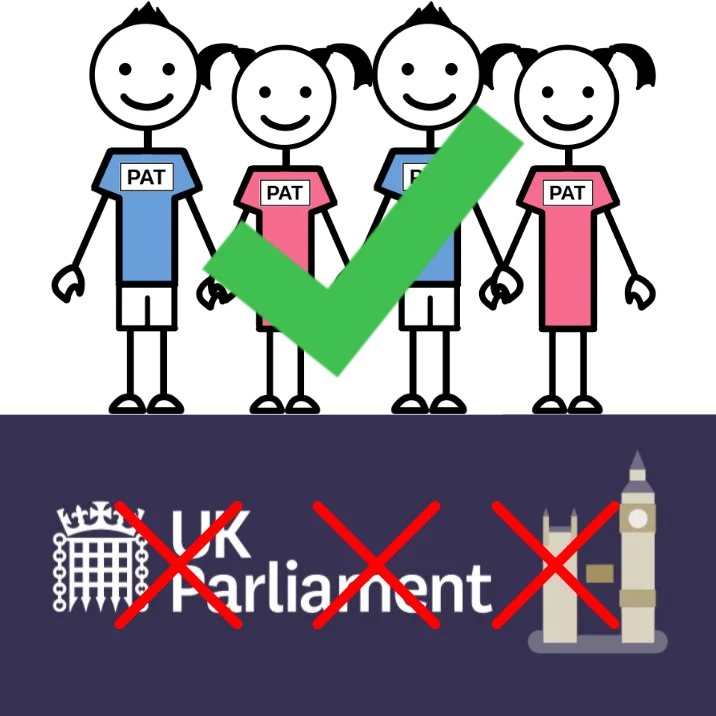
Self Evident Truths Parliament Don't Want You To Know
#1
Fundamental law is self-evident. All are equal under the law (meaning what one individual can do all can do) and: no one is above the law (meaning every individual is accountable for any harm they cause)
#2
It is self-evident there is no law that gives any individual or group of individuals any authority to create duties, rights or obligations for any individual or group of individuals and this includes Parliament Assembled
#3
It is self-evident that no one, including Parliament Assembled can impose their will upon an individual or group of individuals and if that where the case it would be an act of force, be unlawful and akin to slavery
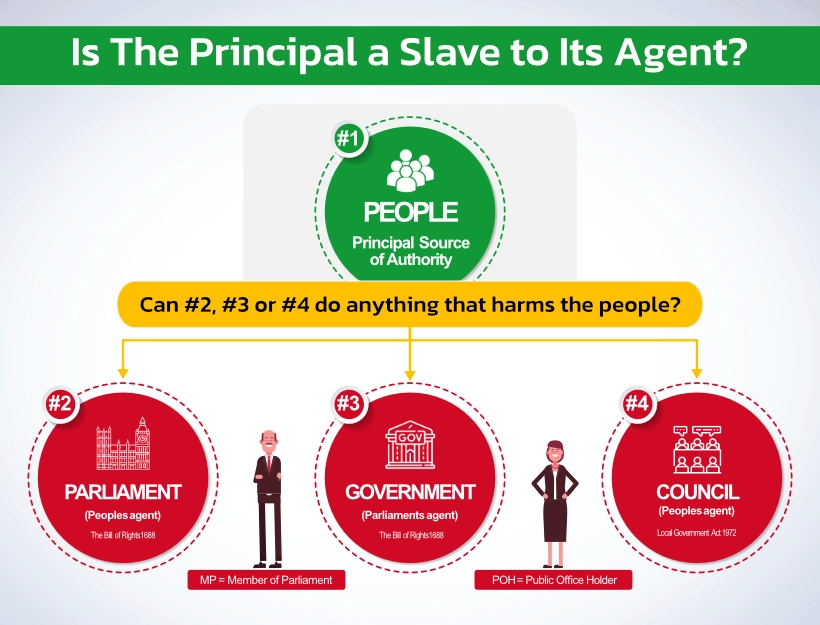
Myth Buster Parliaments Claims?
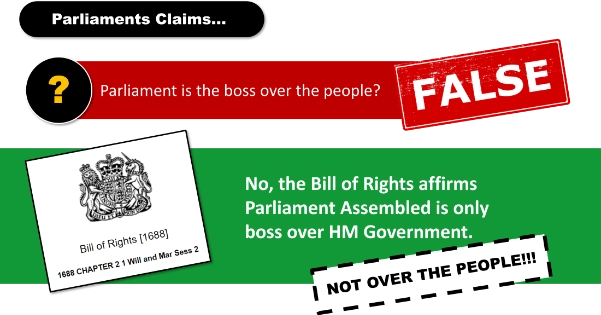
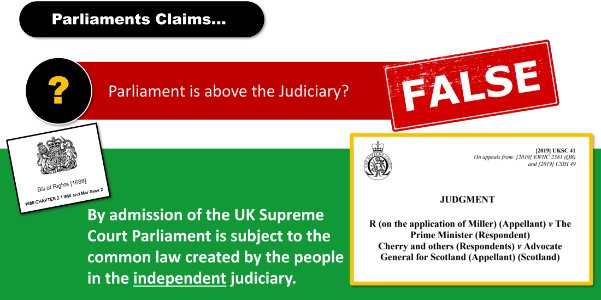
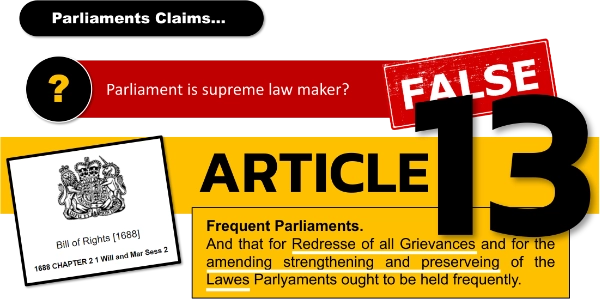
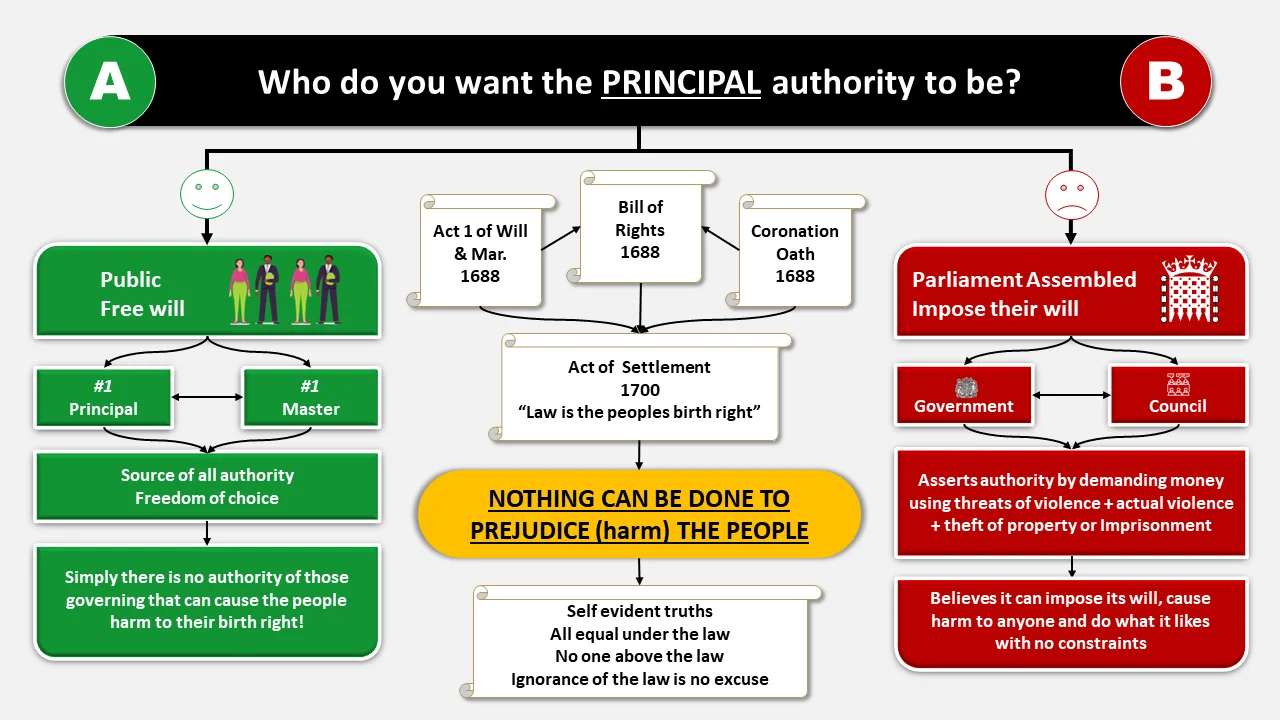
Divine Right of Kings Pre Bill of rights 1688
Prior to 1688, we had the divine right of kings, meaning that the monarch could impose their will on anyone they chose and King James second was certainly running amok over our ancient rights and liberties.
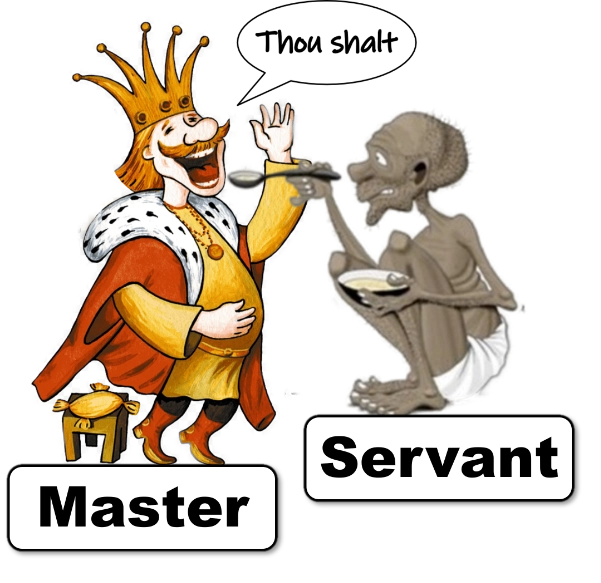
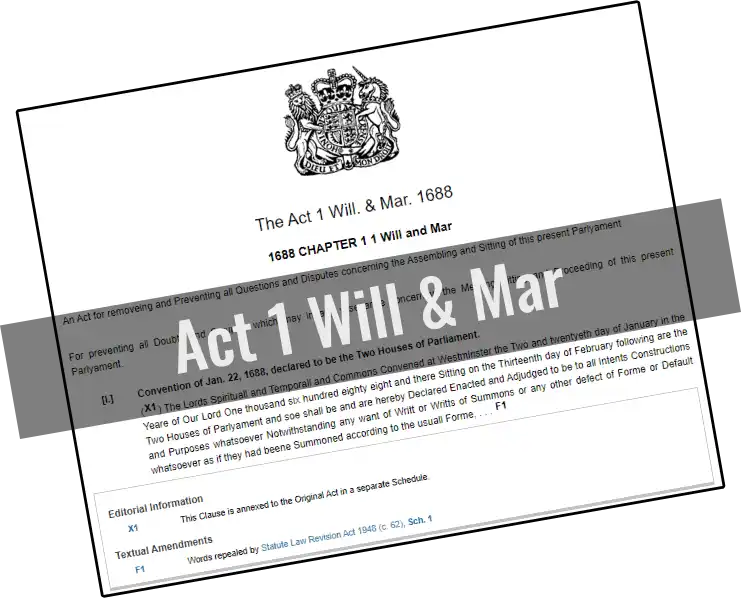
Act 1 of Will & Mar. 1688
A group of unincorporated individuals
'natural person' = living man and woman / persons / people / humans or what ever style or title anyone uses to describe them.
The style or title = fiction of law / legal fiction / strawman.
who at the time incorporated themselves into 2 fictions of law known as
The House of lords -Lord Spiritual (Church) and Temporal (used to be Barons and now are a series of titles and styles that MP's ask the Monarch to grant), and
the House of Commons (MP's),
who together are known as the fiction of law known as Parliament.
Bill of Rights 1688
In the first sentence of The Bill of Rights 1688 the people who make up the fiction of law, Parliament Assembled are admitted to be the people's representatives, and it is trite agency law (accepted without argument in law) that the slave cannot bind its master without the master's consent.
This means we are the PRINCIPAL and Parliament is the agent of the people and you the council are sub agent.
Further the BOR 1688 states that they cannot do anything to the PREDUDICE (that's HARM) of the people, and all successors are bound by the same authority as this is the document which creates parliament Assembled without which it does not exist.
Source https://www.legislation.gov.uk/aep/WillandMarSess2/1/2
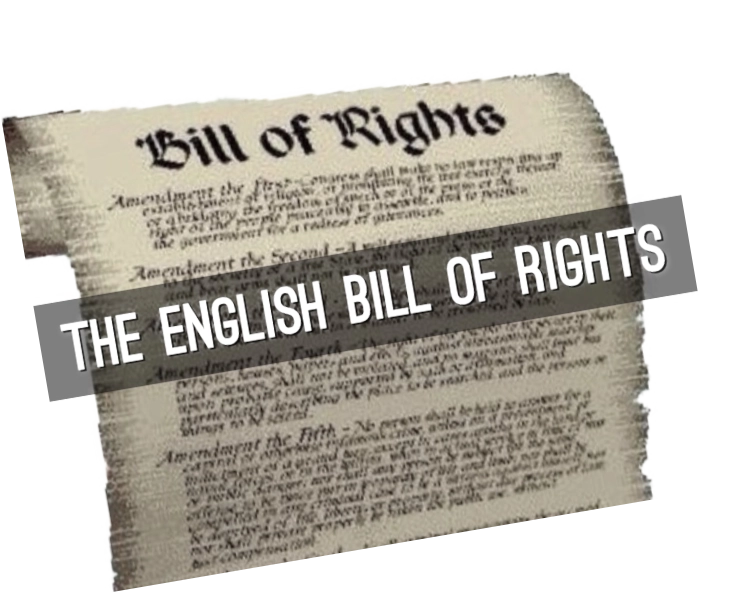
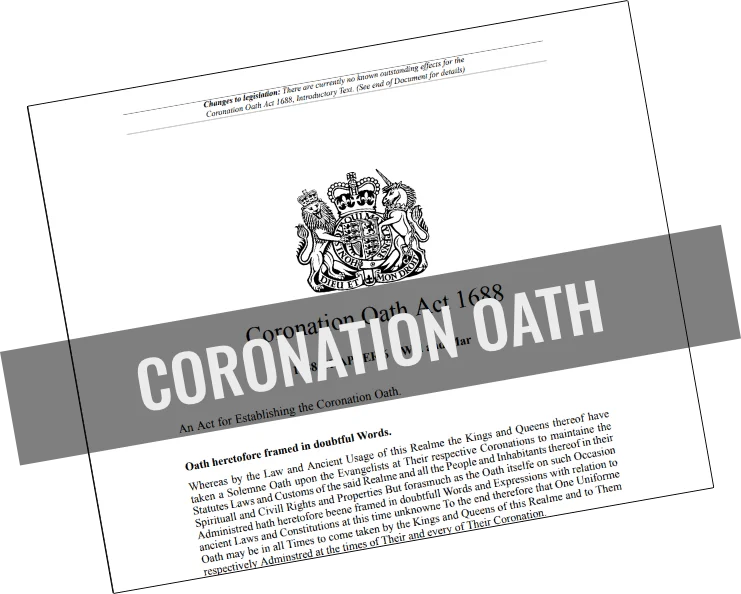
Coronation Oath Act 1688
Using 'Statutes in Parlyament agreed upon' to govern the people according to their respective laws and customs.
Affirming statutes are subject to the laws and customs of the people = the rules of equity!
Act of Settlement 1700
Created to deal with the succession of the crown and clarify any more misunderstandings in the Bill of Rights 1688 as to the peoples 'ancient customs and liberty, and
- in section IV defines LAW as the PEOPLE'S BIRTH RIGHT (granted by creation), and
- contracts by subjugation those governing to do so according to the same including binding their successors.
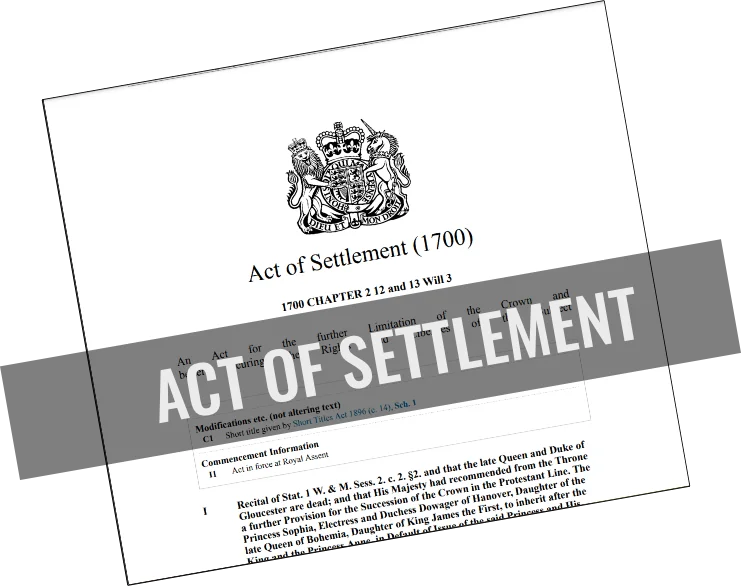
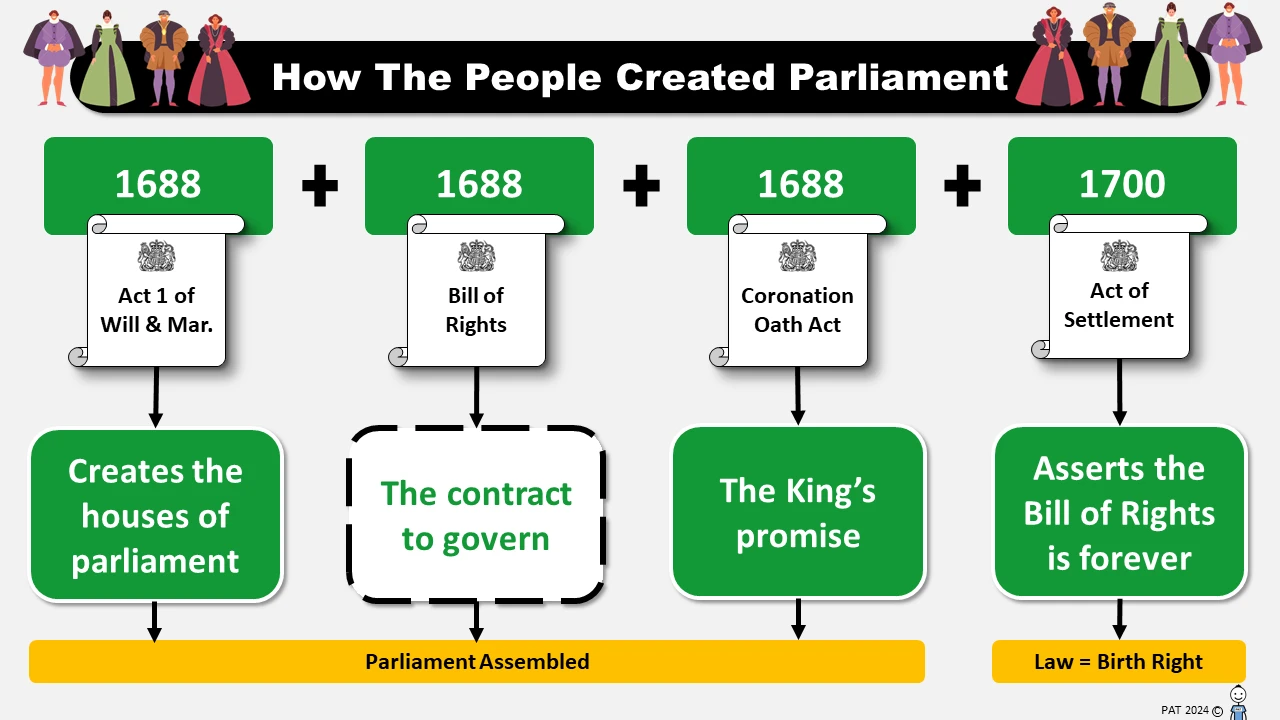
We did this by creating the two houses of parliament, a contract to govern and the Kings promise – which is known as parliament assembled. To which the 1700 Act of Settlement confirmed as being FOREVER and that Law is the peoples birth right.
Tyrannical Timeline
Present Day: Divine Right of Parliament
Now parliament are imposing their will upon the people
1700 Act of Settlement
Assert Bill of Rights is forever and Law is our Birth Right
1688 Coronation Oath Act
The King's promise
1688 The Bill of Rights
The contract to govern
Act 1 of Will & Mar
Creates the houses of parliament
Divine Right of Kings - Pre BOR 1688
Prior to 1688, we had the divine right of kings, meaning that the monarch could impose their will on anyone they chose and King James second was certainly running amok over our ancient rights and liberties
Beyond Parliamentary Supremacy: Equity, Common Law, and the True Sources of Law in the UK
The Origins of Common Law and Equity in the UK
The Norman invasion introduced common law precedent, which remains the UK's legal system. Magna Carta 1297 codified this "Law of the Land," establishing the rights of the people and binding those in power. Historically, the Crown held all legal authority. However, by 1610, legal precedent recognized common law, statute law, and custom as the only sources of law. In 1615, the rules of equity were established, prevailing over common law in cases of conflict.
The Rise of Parliament and its Legal Framework
The 1689 Convention Parliament created the House of Lords, House of Commons, and the Monarchy. These entities have no corporate or legal status, acting in person as acknowledged in UK Public General Acts.
The Bill of Rights and its Guarantees
The Bill of Rights 1688 incorporates the Coronation Oath Act 1688, asserting its authority from "the people's ancient rights and liberties." It establishes Parliament as the people's agent with legislative supremacy, responsible for addressing grievances and upholding the law.
Independent Branches of Government
The Coronation Oath Act 1688 establishes independent Executive and Judicial branches. The Judiciary is bound by the Bill of Rights to be non-religious, protect the right to petition, and ensure fair trials, including trial by jury.
Further Restrictions on Governmental Power
The Bill of Rights restricts Parliament's power to levy taxes and maintain a standing army during peacetime. It also guarantees the right to bear arms for self-defense and freedom of speech. These limitations are binding on all who govern, and their repeal would remove the legal authority to govern.
The Hierarchy of Law in the UK
The ultimate legal authority remains the royal prerogative, primarily a formality. Since 1615, the hierarchy of law places the rules of equity above common law, which in turn supersedes legislation. This contradicts the notion of Parliamentary supremacy while upholding the rule of law and equality before the law. The Bill of Rights serves as a contract outlining how those in power must govern according to the people's law, effectively acting as a written constitution.
SUMMARY
- The Norman invasion established common law precedent, which remains the primary legal system in the UK, expressed in the Magna Carta 1297.
- Royal prerogative historically included legislative, executive, and judicial supremacy exercised through the Crown, as seen in James I's 1609 speech.
- In 1610, it was resolved that prerogative powers arise from common law, statute law, and custom, with lawful excuse argued using the rules of equity prevailing over common law.
- The 1689 Convention Parliament created the "Lords Spiritual and Temporal," "Commons," and "Their Majesties," entities without corporate or legal status.
- The Bill of Rights 1688 (BOR1688) incorporates the Coronation Oath Act 1688 (COA1688) based on the people's ancient rights and liberties.
- The BOR1688 acknowledges Parliament as the people's agent with legislative supremacy, constrained to address grievances and preserve the law.
- The COA168813 creates an independent Executive and Judiciary, constrained by principles such as religious neutrality, right to petition the monarch, trial by jury, and restrictions on bail and punishment.
- Further restrictions include Parliament granting authority for levying money and maintaining standing armies in peacetime. Article 7 ensures the right to bear arms, and Article 9 ensures freedom of speech under equity rules.
- The existing law asserts royal prerogative as the ultimate legal authority, hierarchy of law with equity over common law over legislation, and the BOR1688 as a lawful contract for governing based on the people's law.
- This refutes claims of parliamentary supremacy and emphasizes equality under the law, no one being above the law, and the rule of law as the primary constitutional principle, thereby countering the argument that the UK lacks a written constitution.

You can JOIN PAT, but first read all the pages...
3 of 7

